Computer vision is an interdisciplinary field that trains computers to perceive crucial information from their real-world surroundings and be able to analyze, respond and perform various tasks in a way similar to the human visual system.
The field has made tremendous progress in recent years. Currently, there are infinite real-world applications of the technology, including medical image processing, surveillance, and, most notably, self-driving cars.
Unsurprisingly, numerous businesses, startups, and tech giants alike, leverage computer vision as a way to differentiate, create new business opportunities, and be more competitive.
Hence, demand for computer vision specialists has accelerated over recent years, so does the lucrativeness of the career.
According to ZipRecruiter, an average computer vision engineer in the US earns as much as $123852 per year. Those with years of experience may also make many times that amount.
Computer vision is not for absolute beginners, but those who have strong programming and data science experience can still learn all the foundational concepts and obtain valuable hands-on experience through taking online courses.
However, this does not mean that you should enroll in any computer vision course or program. Some can be low-quality and deter your skill development as a result.
This post does the heavy lifting for you. It only features the best computer vision courses available online. You can then conveniently choose the one that fits your learning style.
Affiliate Disclosure: This post from Victory Tale contains affiliate links. If you purchase computer vision courses through them, we will receive a small commission from its providers.
Nevertheless, we always value integrity and prioritize our audience’s interests. You can thus rest assured that we will present each course truthfully.
Things You Should Know
Prerequisites
As indicated above, you need robust programming and data science experience for computer vision courses. Below are the prerequisites in detail. The links below will direct you to lists of the best courses for each topic.
- Probability & Statistics (preferably Statistics for Data Science)
- Advanced Python Programming (You should be comfortable with object-oriented programming (OOP) and understand codes written by others)
- Machine Learning algorithms and techniques
- Deep Learning Fundamentals (Neural Networks)
- Deep Learning Frameworks/Libraries (PyTorch, Tensorflow, or Keras)
If you are not confident in your skills, you might want to retake the courses or at least review them using official documentation.
Criteria
The following are my criteria for the best computer vision courses.
- Credible instructor with years of experience in computer vision research or developing computer vision technology
- User-friendly learning platform
- High-quality course materials
- Provide excellent value for money
- Positive reviews by real students
- My personal experience with the course or the instructor (if any) must be positive.
1. Become a Computer Vision Expert
If you are looking for a comprehensive program with adequate student support, this Udacity Nanodegree program may be the best option available.
You will learn from experts who have years of experience developing and researching computer vision at top companies and institutions.

Course Content
Created in collaboration with Nvidia Deep Learning Institute and Affectiva, this program comprises three minor sections as follows:
1. Introduction to Computer Vision – The first section will introduce you to computer vision essentials. You will learn about image processing and how to extract features from images. Later on, you will apply deep learning methods to classification tasks.
2. Advanced Computer Vision and Deep Learning – The second section centers on applying deep learning architectures to computer vision tasks. You will combine convoluted neural networks (CNNs) and recurrent neural networks (RNNs) to build a tool that can automatically generate captions.
3. Object Tracking & Localization – The third section will explain how to train machines to locate an object and track it over time. Such techniques are instrumental in developing self-driving cars and drone flights.
All sections are equipped with assignments, quizzes, and, most importantly, a real-world project. In total, you will work on three fascinating projects.
Therefore, once you complete the program, you will gain sufficient hands-on experience that you can handily develop further.
Regarding the pace, Udacity recommends spending 10-15 hours per week, and you will finish the program in three months.
The recommended pace requires a high weekly commitment. However, as the program is entirely self-paced, you can set your schedule at will.
Just keep in mind that Udacity uses a subscription model in pricing. The more time you spend on the program, the higher the tuition (see #pricing).
Student Support
Most online courses provide insufficient student support, but that is not the case with Udacity. This is because all students can access three types of support as follows:
Technical Support – If you encounter a problem in the course, get stuck in assignments, or do not understand the concepts at all, you can ask the team 24/7.
Most students receive a personalized response (not automated) in an hour, which is super fast compared to other online courses that you have to wait days, weeks, or even forever.
Project Reviews – You can make unlimited requests for experts to review your projects. They will then provide personalized feedback, valuable tips, and recommendations on industry best practices.
The turnaround time is slightly more than an hour. Hence, you can create healthy feedback loops that are beneficial for your learning.
This game-changing student support clearly distinguishes Udacity from other platforms, as students can learn other useful stuff from experts besides lessons in the course curriculum.
Career Services – Upon program completion, the career services team will review your resume, LinkedIn profile, and Github portfolio to ensure they are ready to be submitted in job applications, increasing the likelihood of receiving interview invitations from top companies.
Pricing
As mentioned above, Udacity uses a subscription model. The monthly payment is $399 or $339 if you pay three months upfront.
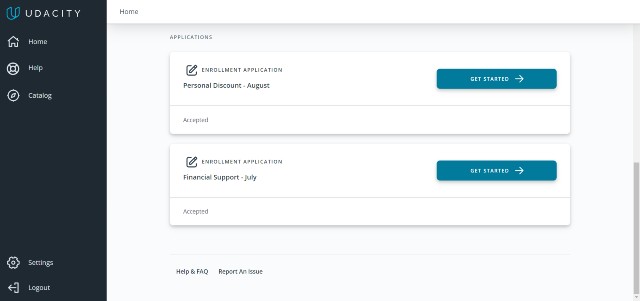
However, Udacity frequently offers discounts and financial support. Such deals can be as high as 50% to 75%. Thus, you can possibly enroll in this top-notch computer vision program by paying only $100 per month.
[sc name=”udacity” ][/sc]Pros and Cons
Pros
- Learn computer vision from experienced experts from various industries
- Well-structured curriculum + Useful course materials
- Highly informative and in-depth lessons
- Various assignments and real-world projects to complete to strengthen your skills
- Excellent and speedy technical support that enriches your learning experience and eliminates any frustration
- Learn more from experts through project reviews
- Self-paced learning
Cons
- Expensive compared to other computer vision online courses
2. Python for Computer Vision with OpenCV and Deep Learning
This course is another highly-rated computer vision tutorial on Udemy. You will learn with Jose Portilla, an experienced data scientist who is now the head of data science at Pierian Data Inc.
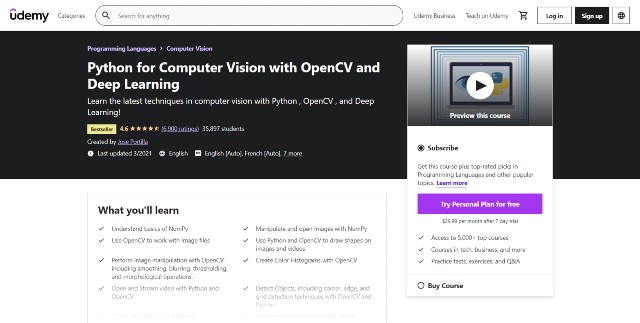
Course Content
In essence, you will learn how to utilize Python and the OpenCV library to perform computer vision tasks. Below is a content summary of this 14-hour course.
- NumPy reviews + Image basics
- Image Basics with OpenCV
- Deep dive into image processing (Blending, Pasting, Blurring, Smoothing, Gradients, Histograms, etc.)
- Video Basics
- Deep Dive into Object Detection (Corner/Grid/Contour/Edge Detection, Feature Matching, Watershed Algorithm)
- Object Tracking
- Deep Learning for computer vision
I like the curriculum of this course because it is step-by-step. You will first learn about fundamental computer vision concepts and start implementing them using Python and OpenCV.
Furthermore, when explaining computer vision applications, Jose will start with a fundamental machine learning aspect and proceed to more challenging tasks gradually.
Reviews: 4.6/5.0 from 35800+ students
Pros and Cons
Pros
- Step-by-step curriculum
- Provide concise explanations for computer vision basics
- Active Q&A Forum
- Lifetime access + 30-day money-back guarantee
- Inexpensive ($20 or lower when on sale)
Cons
- Unlike other leading instructors on Udemy, Jose rarely updates the content. Thus, you might only receive one or two updates a year.
- The assignments are not challenging.
- A few reviewers believe Jose has still not provided sufficient explanations on some concepts.
3. Computer Vision Masterclass
If you are looking for an all-in-one computer vision course at an attractive price, this one by Jones Granatyr and Gabriel Alves should be on the radar.
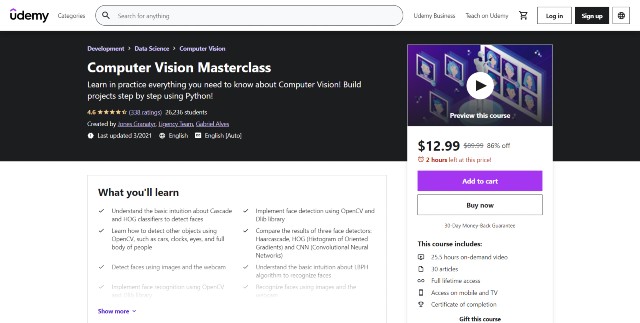
Course Content
This course primarily covers similar content as Jose’s. However, it drills much deeper into all the computer vision stuff. Below is an overview of the course curriculum.
- Face Detection (Cascade Classifiers, Haarcascades parameters, HOG, etc.)
- Face Recognition (LBPH, detecting facial descriptors, etc.)
- Transfer learning and fine-tuning
- Neural networks for emotion classifications
- Deep dive into Autoencoders
- Object detection with YOLO
- Gesture and action recognition
- Deep Dream and Style Transfer
- GANs
- Image Segmentation
With 25.5 hours of on-demand video, this course is unarguably one of the most informative and comprehensive computer vision courses on Udemy.
You will learn all foundational concepts in detail and handily implement them using OpenCV and other relevant libraries.
Reviews: 4.6/5.0 from 26000+ students
Pros and Cons
Pros
- In-depth and informative lessons
- Detailed explanations of concepts with real-world examples
- Comprehensive curriculum
- Homework and additional reading are available for all sections
- Lifetime Access + 30-day money-back guarantee
- Inexpensive (you can get the course at $20 or lower)
Cons
- It can be slightly challenging to understand the instructors at the start since both have an accent. However, with the assistance of auto-generated subtitles, the issue does not seem to be problematic.
4. Deep Learning and Computer Vision A-Z™: OpenCV, SSD & GANs
This Udemy course from Hadelin de Ponteves and Kirill Eremenko provides an excellent overview of all the latest computer vision tools that specialists are using.
If you want to get started in computer vision in the most affordable way, this course is one of the best options you could find.
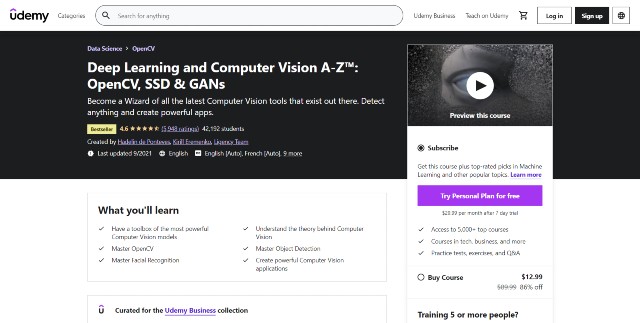
Course Content
Below is a summary of all course content.
- Face detection concepts (Viola-Jones Algorithms, Classifiers, Adaboost)
- Face detection in OpenCV
- Object detection concepts
- Object detection with SSD
- GANs and Image Creation
- ANNs and CNNs
In this course, both instructors will switch back and forth between concepts and projects. Thus, you will learn the concepts and put what you have learned into use right away.
I also find the projects in this course extremely interesting. For example, you will build a happiness detector that can evaluate human emotions.
The length of this video course is 11 hours. It receives mostly positive reviews, scoring 4.6/5.0 from 42000+ students.
Pros and Cons
Pros
- Learn from highly knowledgeable instructors
- Well-structured curriculum
- Clear explanations
- Several real-world projects to complete to enhance your skills
- Lifetime access + 30-day money-back guarantee
- Inexpensive ($20 or lower when on sale)
Cons
- I found it is slightly difficult to fully understand what the instructors said at the beginning. However, you will be familiar with their accents over time, so I don’t think this will be an issue.
- Cover only the basics
- A few parts of the content are outdated.
5. Introduction to Computer Vision and Image Processing
This course from IBM is another introductory course on computer vision that beginners might want to consider. Two IBM data scientists will guide you through the foundational concepts and explain the most popular applications of computer vision technology.
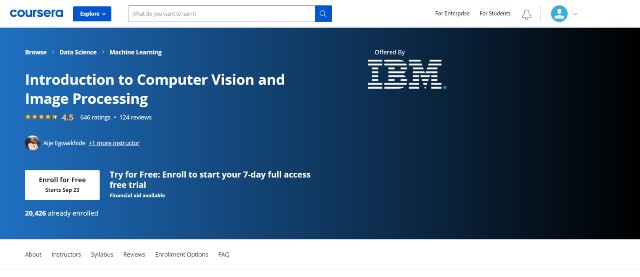
Course Content
Below is a summary of what you will learn from the course.
- Introduction to Computer Vision: Overview, Recent Research, and Applications
- Image Processing with OpenCV and Pillow
- How to apply machine learning techniques in classification tasks
- How to use deep learning architectures in image classification.
- Deep dive into object detection
- Project: Build a computer vision app and test it
Note: You will be using IBM Watson in most parts of the course.
IBM recommends spending 21 hours completing all content. From a general perspective, the course will not drill deeper into in-depth concepts like Udacity and Udemy courses. However, it serves perfectly as a prelude to your new chapter in computer vision.
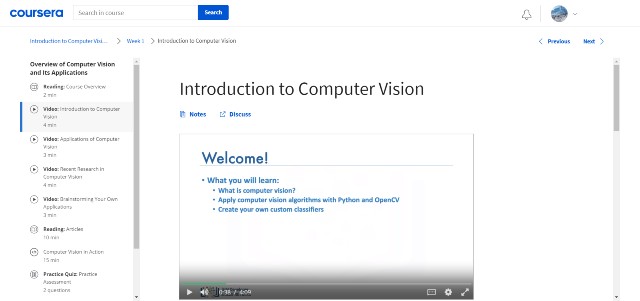
Regarding pricing, you can audit the course for free. Alternatively, you can subscribe to gain access to graded assignments and projects along with a certificate of completion.
Furthermore, since this course is a part of the Professional Certificate Program, once you subscribe, you can take other courses in the same program as well.
Nevertheless, as of September 2021, numerous students have encountered technical hurdles. I thus suggest you stick with the free auditing option.
Pros and Cons
Pros
- Learn from leading IBM data scientists
- Well-structured curriculum
- Introduce computer vision concepts in a digestible way
- Provide various real-world examples
- Free auditing
Cons
- Numerous students have reported technical hurdles, particularly on the assignments.
- The content is centered on IBM Watson and covers only basic stuff. Thus, this course is optimal if you want to create a computer vision app of your own.
6. Advanced Computer Vision with TensorFlow
TensorFlow is one of the most popular deep learning libraries. If you want to understand how to use TensorFlow for computer vision tasks, this course from deeplearning.ai is definitely worth your consideration.
Despite its name, this course is NOT an advanced course on computer vision. You don’t need to take any online computer vision courses before.
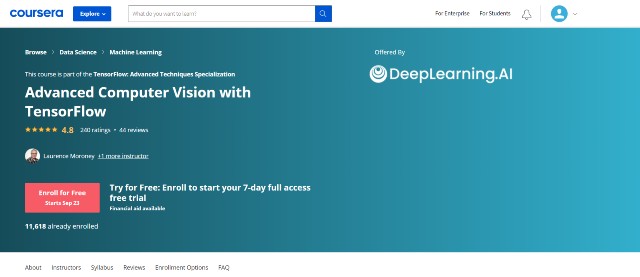
Course Content
What you will learn from this course is as follows:
- Introduction to Computer Vision (General concepts and Transfer Learning)
- Object Detection
- Image Segmentation
- Visualization and Interpretability
In this course, you will build various models on TensorFlow or use those retrieved from the TensorFlow hub and train them to perform multiple computer vision tasks, including object detection and image segmentation.
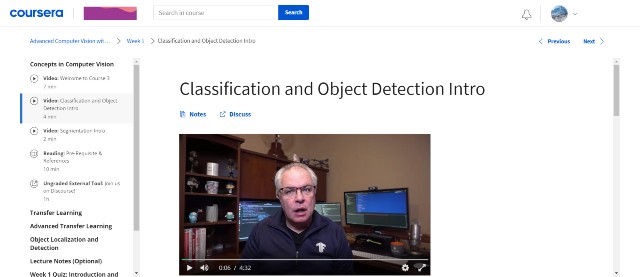
As all the lessons are in-depth and informative, this course is one of the best options for TensorFlow users who want to learn computer vision.
Like the previous counterpart, you can audit it for free. However, since the curriculum is project-based and has very few technical issues, I think a subscription to the full program may be a better option.
Once you subscribe, you can access grading, a certificate of completion, and four other courses in deeplearning.ai’s TensorFlow series.
Pros and Cons
Pros
- Best computer vision course for TensorFlow users
- Well-structured, project-based curriculum
- In-depth and informative lessons, focusing on practical applications
- Free auditing
Cons
- Some reviewers pointed out that the assignments are not adequately challenging.
Coursera Plus
If you are interested in more than one course on the Coursera platform, I suggest subscribing to Coursera Plus to save your money.
At the cost of $399 per year ($33.25 per month), Coursera Plus grants access to more than 3000 courses (more than 95% of those available on the platform.)
Compared to a regular subscription, Coursera Plus is cheaper ($33.25 vs. $39-$79). The subscription will provide even more value if you plan to subscribe to multiple specializations.
[sc name=”coursera” ][/sc]7. Applied Artificial Intelligence: Computer Vision and Image Analysis
Suppose you have a robust background in Microsoft Azure. This course on the FutureLearn platform is an excellent alternative to learn computer vision. You will learn from experts at CloudSwyft, a company that provides digital training across the modern workplace.
Note: This course is accredited by Microsoft, thus optimal if you want to prepare for relevant Microsoft credentials.
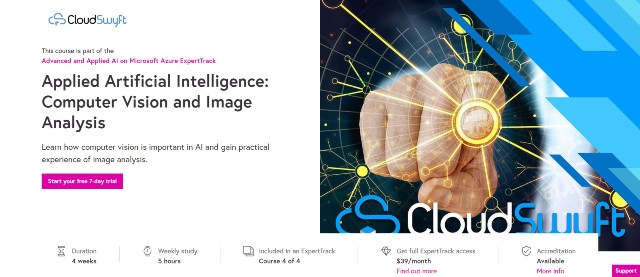
Course Content
A summary of the course content is as follows.
- Introduction to Computer Vision
- Image Features and Classical Image Analysis Techniques such as Edge Detection, Watershed, Distance Transformation, and K-mean clustering
- Use OpenCV to implement classic image analysis algorithms
- Comparison between Classical/Deep Learning Object Classification Techniques
- Object Detection & Classification (Apply Microsoft Res-Net to object classification)
- Deep Image Segmentation
You will have an opportunity to get hands-on experience as well. For instance, you will use OpenCV and Microsoft Cognitive Toolkit to train a model to segment images into meaningful parts.
Unlike Coursera, free auditing is not available. If you are interested in the program, you need to subscribe to ExpertTrack ($39 per month). All students will receive full instructor support, grading, an online certificate, and access to three other courses on the same track (including an NLP course.)
CloudSwyft suggests spending 5 hours per week on the course, which is perfectly manageable for those with a full-time job. At this pace, you will complete it in 4 weeks.
Pros and Cons
Pros
- Excellent course to learn computer vision if you are familiar with Azure or plan to pursue Microsoft credentials in AI (AI-100 and AI-900)
- Accredited by Microsoft
- Well-structured curriculum
- Self-paced learning
- Progress page to guide your learning
Cons
- Not suitable for those who do not plan to use Azure in the long run
Other Alternatives
Introduction to Computer Vision – Offered by Georgia Tech on the Udacity platform, this free course explains the foundational concepts of computer vision in detail.
As computer vision is booming, I expect more courses will be released in the future. If I have found more high-quality courses, I will update this post immediately.